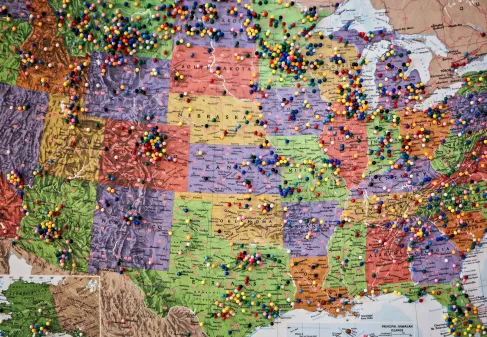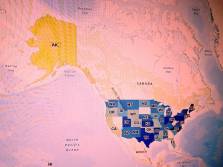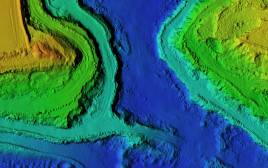Congress introduces Geospatial Data Act to the delight of GIS advocates

Ambitious new federal legislation has been introduced that would fill longstanding governance gaps in the world of geospatial information systems (GIS).
A pair of bills — S. 2128 and H.R. 4395, also known as the Geospatial Data Act — were highlighted by group of leaders at a GIS Day reception in Washington, D.C., on Wednesday for their potential to complete work that has been underway for nearly a quarter-century. Any previous controversy with the legislation’s contents appeared to have dissipated as leaders from the American Association of Geographers (AAG) and the National States Geographic Information Council (NSGIC) noted the power the legislation would wield if written into law.
“GIS is leading to millions of new jobs every year and the power and impact it has on the U.S. government has been transformative,” said John Wertman, senior program manager for government relations at AAG, referencing research commissioned by Google that says geospatial services “directly create” 4 million jobs per year and drive $1.2 trillion in annual sales globally.
As the proliferation of smartphones has boosted the importance of GIS and GPS technologies in recent years, the government organizations charged with managing the adoption, organizational capabilities and data sharing and management surrounding those technologies has lagged behind. The Geospatial Data Act would codify existing federal governance structures, like the Federal Geographic Data Committee and the National Geospatial Advisory Committee, and mandate congressional oversight of federal geospatial expenditure.
For states, it would also encourage new partnerships and governance structures that give subnational entities a stronger voice in the further development of GIS governance.
The centerpiece of these efforts is the National Spatial Data Infrastructure (NSDI), formed by an executive order in 1994, that has never lived up to its original intent of effectively coordinating geospatial data efforts across all sectors. If passed, the Geospatial Data Act is expected to remedy many of the NSDI’s shortcomings.
“The NSDI has mostly been a federal effort with little relevance, frankly, for state, tribal, regional or local governments,” said Andy Rowan, NSGIC president and deputy chief technology officer for the State of New Jersey.
Rowan said he was excited and “extremely encouraged” with the introduction of the act, which he called “a momentous occasion.”
The AAG says the act could also save taxpayers millions of dollars.
“There is substantial duplication across agencies as independent geospatial data programs are developed and utilized,” an official statement from AAG reads. “The legislation will help agencies work in concert to undertake geospatial initiatives. Furthermore, the GeoPlatform would be strengthened by the bill to ensure public and commercial access to a wide and growing range of geospatial data. This would directly benefit and promote public safety, emergency response, community planning, and job growth.”
Republican Rep. Bruce Westerman, who introduced the bill to the House, said he likes to work on legislation by bringing together groups of people who can “work positively and make something together.” Indeed, legislators received feedback from groups like AAG and NSGIC, which submitted letters of support that received signatures from 37 leading GIS and technology organizations.
Republican Sen. Orrin Hatch introduced companion legislation to the Senate.
For AAG President Doug Richardson, the legislation is the product of more than a decade of work that has grown increasingly relevant. He noted that geospatial technologies like GIS and GPS are “a tremendous force” that were developed by American companies like Esri and Google and have now become essential.
“Geospatial data and geographic technologies are now core to the operations of almost every organization in the United States,” Richardson said.
Jake Williams contributed reporting to this story.






